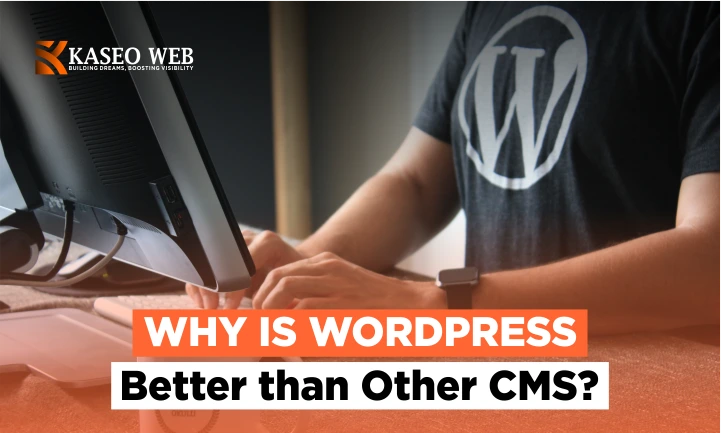
The choice of a Content Management System (CMS) is dominant for website owners. CMS can make or break the online presence of a business. Enter WordPress, the juggernaut of CMS platforms that are known for its versatility, user-friendliness, and powerful features.
In this complete guide from Best Web Design Company, we’ll delve into “Why WordPress is the preferred CMS choice?” for many as compared to alternatives of CMS. Let’s begin this journey to uncover “Why is WordPress Better than other CMS?”
Introduction to CMS
Modern websites would not function without content management systems (CMS). Users can create and manage digital material without having to learn complex code. There are several content management systems out there but none of them can match WordPress.
Understanding WordPress
WordPress is much more than a content management system. It has been the most popular content management system (CMS) for well over a decade. WordPress has a long and illustrious history, and its user base is growing.
1. Market Dominance
WordPress is the undeniable champion when it comes to CMS market share. In a league of its own, it powers over 40% of all websites on the internet. This massive user base attests to its unparalleled popularity and reliability.
2. Comparing WordPress to Other CMS
Now, let’s compare WordPress’s pricing structure to other CMS alternatives:
Joomla:
- Joomla is also an open-source CMS, so the core software is free.
- Similar to WordPress, you’ll need to pay for a domain name and hosting.
- The availability of free themes and extensions is somewhat limited compared to WordPress, so you may need to invest more in premium options.
- Overall, Joomla’s costs are comparable to those of WordPress.
Drupal:
- Drupal, another open-source CMS, offers a free core software.
- Hosting and domain expenses are similar to WordPress CMS websites.
- Drupal’s learning curve is steeper, which may lead to higher development costs if you require professional assistance.
- Premium themes and modules can be more expensive than WordPress equivalents.
Wix:
- Wix is a website builder rather than a traditional CMS.
- Wix offers free plans with Wix-branded domains, but to use a custom domain, you’ll need to upgrade to a paid plan.
- Paid plans can range from $14 to $49 per month for personal websites and up to $500 per month for e-commerce sites.
- While Wix is user-friendly, its costs can add up, especially for businesses with specific needs.
3. Is WordPress Cost-Competitive?
WordPress offers a cost-competitive solution for building and maintaining a website. You have a wide range of options for controlling your expenses as its open-source nature consists of a vast community of developers and users. You can start with a small budget and scale up as your website grows, making WordPress an attractive choice for businesses and individuals alike.
4. User-Friendly Interface
WordPress boasts an exceptionally intuitive and user-friendly interface. The dashboard is designed to be straightforward and accessible whether you are a seasoned web developer or a beginner. You don’t need advanced technical expertise to navigate and manage your website effectively.
5. SEO-Friendly Features
Search Engine Optimization (SEO) is essential for a website’s visibility. WordPress recognizes this importance and equips users with built-in SEO tools. WordPress simplifies the process of fine-tuning your website to rank higher on search engine results pages from optimizing meta tags to generating XML sitemaps. This SEO advantage cannot be overstated especially for businesses and bloggers aiming to reach a broader audience.
6. Security Measures
WordPress takes security seriously and offers robust features to safeguard your website. By following best practices such as regularly updating themes and plugins, using strong passwords and implementing security plugins, you can create a virtual fortress against potential threats. WordPress’s commitment to security ensures that your website remains resilient and reliable.
7. Scalability and Flexibility
One of the features of the WordPress CMS website is its scalability and flexibility. WordPress can scale effortlessly to accommodate your ambitions whether you are starting with a personal blog or managing an enterprise-level website. You won’t outgrow the platform and as your needs evolve, WordPress can adapt to meet them. This scalability is a significant advantage as it allows you to expand and diversify your online presence without switching CMS platforms.
8. Cost-Effectiveness
When it comes to cost-effectiveness, WordPress shines brightly. It’s open-source software, meaning it’s free to use, which is especially appealing for budget-conscious website creators. Hosting costs are typically budget-friendly, and the extensive availability of free and premium themes and plugins means you can achieve a professional-looking website without breaking the bank.
9. Community and Support
You will find a supportive network of fellow users and experts of WordPress developers ready to help whether you are seeking guidance, troubleshooting assistance, or advice on best practices. WordPress has vibrant users and a community that is one of its most valuable assets. Online forums, documentation, and tutorials are readily available ensuring that you are never alone on your WordPress journey.
In conclusion
So, Why WordPress is the best CMS? Because it’s more than just a CMS, it’s the key to your online success. It is essential to assess your specific needs and budget before making a decision. While WordPress provides cost-effective options, other CMS platforms may better suit certain use cases.
Ultimately, the cost-effectiveness of WordPress depends on your ability to manage your expenses, choose the right hosting plan, and make informed decisions about themes and plugins. WordPress can be a highly affordable and powerful CMS solution with the right approach. It’s no wonder WordPress is hailed as the best CMS globally with its wealth of features and a supportive community.





